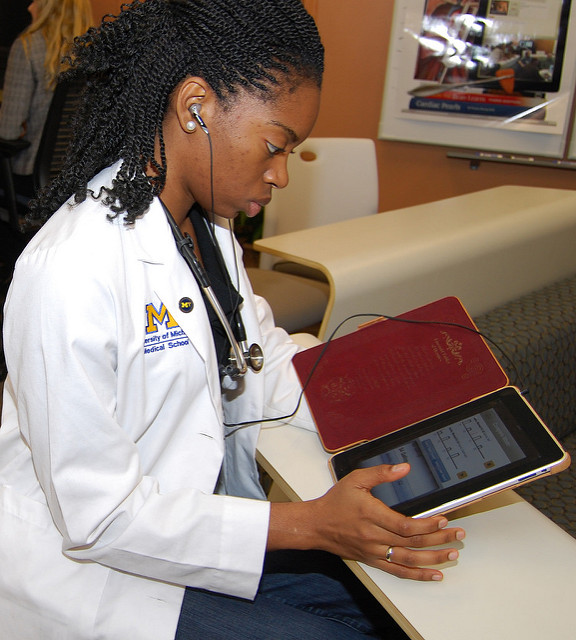A prescription for med schools
Opioid crisis prompts calls for better doctor training
Ashley Lyles • October 28, 2016

Medical schools are modifying their curriculums to better equip budding physicians for the opioid epidemic. [Image Credit: Aki Yao | CC 2.0 License]
Over 900,000 doctors in the United States are authorized to prescribe potentially addictive opioids like OxyContin and Vicodin — but most have only had a few hours of training on the topic, according to the California Health Care Foundation. With about 1.9 million Americans addicted to prescription pain pills, the shortfall in medical training is coming under scrutiny from experts.
“Medical education could certainly improve in training doctors on how addictive drugs work on the brain and how you would identify a patient that might have a problem with a prescription pain killer,” says James Galligan, a pharmacology and toxicology professor at Michigan State University.
Only 3.8 percent of medical schools require their students to take a pain management course, according to a 2012 study; most medical students get only a few hours of training about opioids specifically. But that is beginning to change. Alarmed by the spike in opioid addiction, medical schools and residency programs are modifying existing curriculums and creating new ones to address opioids.
One of the first medical schools to roll out a revised curriculum is the nation’s third oldest, Harvard Medical School. Its course revisions are scheduled to take effect next year. Harvard now requires second year students to take a course that emphasizes opioid use disorder, medication treatment options and identifying adolescent substance abuse. And a first year course now places a greater emphasis on opioid use disorder.
Boston University School of Medicine, Tufts University School of Medicine and the University of Massachusetts Medical School are all implementing similar plans developed by Massachusetts’ Governor’s Opioid Addiction Working Group.
Residency programs are adapting their curriculums by training physicians on how to manage chronic pain, screen patients for their risk of developing an addiction and set up mandatory periodic doctor’s appointments. The internal medicine program at University of Louisville requires residents to use a controlled substance guideline when discussing opiate prescriptions with patients. The anesthesia pain fellowship program there gives physicians training in addiction.
Indiana University requires residents training in internal medicine, pediatrics, family medicine, emergency medicine and psychiatry to develop communication skills and to learn more techniques for managing pain.
Allison McLaughlin, an internal medicine physician at Metro Health Hospital, was a member of the first class to attend Michigan State University College of Osteopathic Medicine following their curriculum change in 2012. McLaughlin says that the modified curriculum covered opioids early on and emphasized alternatives to those medications.
After doctors receive their M.D.s and enter residencies, they tend to learn more about opioid management by working directly with patients. “In residency I feel really knowledgeable [about opioids],” says Allison Bond, an internal medicine resident at Massachusetts General Hospital. Bond, a recent medical school graduate, says that she has received more training on opioids in her residency program than in medicine school, in part because her residency is in primary care. Primary care physicians are often more involved in managing medications than physicians in other specializations.
Revising medical school curriculums won’t help with doctors who are already in practice, so there’s also a push for more opioid training via continuing education courses and public appeals to doctors. For example, the American Medical Association introduced initiatives to help practicing physicians address the epidemic. Maryland and Massachusetts require physicians to complete continuing medication education credits specifically related to opioids.
In August 2016, the United States Surgeon General, Vivek Murthy, joined the effort, writing a letter to all practicing physicians warning them of the dangers of opioids and advising them to prescribe these drugs carefully. He urged doctors to begin screening their patients for prescription drug abuse using evidence-based practices, a method of patient care that takes into account the patient’s characteristics, culture and preferences.
“The opioid epidemic is a vast problem and will require mass participation by physicians and health care professionals to change,” McLaughlin says. “Any change of this size will be difficult to accomplish, but I believe it can be done.”
1 Comment
I had no idea that the problem was this massive. I really hope that we can get further education and information out there to the doctors already in the field. It’s mostly them I worry about because they’re the ones that are dealing with people every day. Things can be fixed in medical courses, but much harder when doctors are already doing their thing.